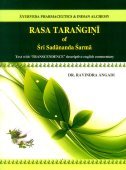Rasadhatu, Rasadhātu, Rasa-dhatu: 10 definitions
Introduction:
Rasadhatu means something in Buddhism, Pali, Hinduism, Sanskrit. If you want to know the exact meaning, history, etymology or English translation of this term then check out the descriptions on this page. Add your comment or reference to a book if you want to contribute to this summary article.
In Hinduism
Ayurveda (science of life)
Source: Google Books: A Practical Approach to the Science of AyurvedaRasadhātu (रसधातु, “plasma” or “nutrient fluid”).—One of the seven fundamental tissues (saptadhātu).—It contains nutrients from digested food that nourish all the tissues, organs and systems of the body. It produces jou and satisfaction and helps in the production of the next dhātu, rakta (blood).
Source: gurumukhi.ru: Ayurveda glossary of termsRasadhātu (रसधातु):—The first Dhātu among seven Dhātus and is dominated by Jala. This is pumped out of Hṛdaya and continuously circulates all over the body to nourish other tissues. It is of 9 Anjalis in quantity. Vyāna and Samāna Vāyu help in its circulation. The major function of Rasa Dhātu is Prīṇana (nourishing).

Āyurveda (आयुर्वेद, ayurveda) is a branch of Indian science dealing with medicine, herbalism, taxology, anatomy, surgery, alchemy and related topics. Traditional practice of Āyurveda in ancient India dates back to at least the first millenium BC. Literature is commonly written in Sanskrit using various poetic metres.
In Buddhism
General definition (in Buddhism)
Source: Wisdom Library: Dharma-samgrahaRasadhātu (रसधातु) or simply rasa refers to the “taste element” and represents one of the eighteen elements (dhātu) as defined in the Dharma-saṃgraha (section 25). The Dharma-samgraha (Dharmasangraha) is an extensive glossary of Buddhist technical terms in Sanskrit (e.g., rasa-dhātu). The work is attributed to Nagarguna who lived around the 2nd century A.D.
Languages of India and abroad
Sanskrit dictionary
Source: DDSA: The practical Sanskrit-English dictionaryRasadhātu (रसधातु).—n. quicksilver.
Rasadhātu is a Sanskrit compound consisting of the terms rasa and dhātu (धातु).
Source: Cologne Digital Sanskrit Dictionaries: Shabda-Sagara Sanskrit-English DictionaryRasadhātu (रसधातु).—n. (-tu) Quicksilver. E. rasa fluid, and dhātu metal.
Source: Cologne Digital Sanskrit Dictionaries: Monier-Williams Sanskrit-English DictionaryRasadhātu (रसधातु):—[=rasa-dhātu] [from rasa > ras] m. ‘fluid metal’, quicksilver, [cf. Lexicographers, esp. such as amarasiṃha, halāyudha, hemacandra, etc.]
Source: Cologne Digital Sanskrit Dictionaries: Yates Sanskrit-English DictionaryRasadhātu (रसधातु):—[rasa-dhātu] (tuḥ) 2. n. Quicksilver.
[Sanskrit to German]
Sanskrit, also spelled संस्कृतम् (saṃskṛtam), is an ancient language of India commonly seen as the grandmother of the Indo-European language family (even English!). Closely allied with Prakrit and Pali, Sanskrit is more exhaustive in both grammar and terms and has the most extensive collection of literature in the world, greatly surpassing its sister-languages Greek and Latin.
Kannada-English dictionary
Source: Alar: Kannada-English corpusRasadhātu (ರಸಧಾತು):—
1) [noun] a heavy, silvery, toxic univalent and bivalent metallicwhich is the only metal that is liquid at ordinary temperatures; mercury.
2) [noun] the thick white fluid containing spermatozoa that is ejaculated by the male genital tract; the semen.
Kannada is a Dravidian language (as opposed to the Indo-European language family) mainly spoken in the southwestern region of India.
See also (Relevant definitions)
Ends with: Aksharasadhatu.
Full-text: Stanya, Santarpana, Prinana, Iracatatu, Artava, Dhatvagni, Raktagni, Aharasa, Rasagni, Saptadhatu, Vyanavata, Ama, Ojas, Pacakapitta, Nirama, Shush.
Relevant text
Search found 6 books and stories containing Rasadhatu, Rasadhātu, Rasa-dhatu, Rasa-dhātu; (plurals include: Rasadhatus, Rasadhātus, dhatus, dhātus). You can also click to the full overview containing English textual excerpts. Below are direct links for the most relevant articles:
Jivanandana of Anandaraya Makhin (Study) (by G. D. Jayalakshmi)
Rajayakṣmā-Pratināyaka < [Chapter 4 - Āyurvedic principles in Jīvanandana Nāṭaka]
A History of Indian Philosophy Volume 2 (by Surendranath Dasgupta)
Part 7 - Growth and Disease < [Chapter XIII - Speculations in the Medical Schools]
A Manual of Abhidhamma (by Nārada Thera)
A Synthesis of the Whole < [Chapter VII - Abhidhamma Categories]
Abhidhamma in Daily Life (by Nina Van Gorkom)
Atharvaveda and Charaka Samhita (by Laxmi Maji)
1b. Study of Fever (Jvara) in the Caraka-Saṃhita < [Chapter 5 - Diseases and Remedies in Atharvaveda and Caraka-Saṃhitā]
Sushruta Samhita, Volume 6: Uttara-tantra (by Kaviraj Kunja Lal Bhishagratna)
Chapter XXXIX - Symptoms and Treatment of Fever (Jvara) < [Canto III - Kaya-chikitsa-tantra (internal medicine)]
Related products


